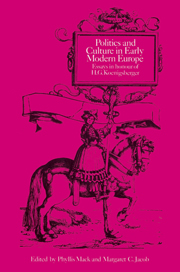Book contents
- Frontmatter
- Contents
- Introduction
- The court of the Spanish Habsburgs: a peculiar institution?
- The magnificent Lorenzo de' Medici: between myth and history
- Political rhetoric and poetic meaning in Renaissance culture: Clément Marot and the Field of Cloth of Gold
- The unlikely Machiavellian: William of Orange and the princely virtues
- The Estates of Brabant to the end of the fifteenth century: the make-up of the assembly
- Presents and pensions: a methodological search and the case study of Count Nils Bielke's prosecution for treason in connection with gratifications from France
- Between Bruni and Machiavelli: history, law and historicism in Poggio Bracciolini
- Constitutional discourse in France, 1527–1549
- Lieuwe van Aitzema: a soured but knowing eye
- John Calvin's contribution to representative government
- Luther and the humanists
- Scholars and ecclesiastical history in the Early Modern period: the influence of Ferdinando Ughelli
- ‘By an Orphean charm’: science and the two cultures in seventeenth-century England
- The crisis of the European mind: Hazard revisited
- Isaac Beeckman and music
- Decadence, shift, cultural changes and the universality of Leonardo da Vinci
- Bibliography of the writings of HELMUT GEORG KOENIGSBERGER
- Index
Lieuwe van Aitzema: a soured but knowing eye
Published online by Cambridge University Press: 20 October 2009
- Frontmatter
- Contents
- Introduction
- The court of the Spanish Habsburgs: a peculiar institution?
- The magnificent Lorenzo de' Medici: between myth and history
- Political rhetoric and poetic meaning in Renaissance culture: Clément Marot and the Field of Cloth of Gold
- The unlikely Machiavellian: William of Orange and the princely virtues
- The Estates of Brabant to the end of the fifteenth century: the make-up of the assembly
- Presents and pensions: a methodological search and the case study of Count Nils Bielke's prosecution for treason in connection with gratifications from France
- Between Bruni and Machiavelli: history, law and historicism in Poggio Bracciolini
- Constitutional discourse in France, 1527–1549
- Lieuwe van Aitzema: a soured but knowing eye
- John Calvin's contribution to representative government
- Luther and the humanists
- Scholars and ecclesiastical history in the Early Modern period: the influence of Ferdinando Ughelli
- ‘By an Orphean charm’: science and the two cultures in seventeenth-century England
- The crisis of the European mind: Hazard revisited
- Isaac Beeckman and music
- Decadence, shift, cultural changes and the universality of Leonardo da Vinci
- Bibliography of the writings of HELMUT GEORG KOENIGSBERGER
- Index
Summary
One encounters some of the most interesting figures of history while venturing down the bypaths of one's researches. I found one such while cutting through the thickets of seventeenth-century Dutch history. Lieuwe van Aitzema is hardly unknown to specialists, to be sure, but he has been for them little more than a richly informed chronicler, if one whose pen was dipped in the acid of total cynicism. How that attitude squared with his apparent conversion to Catholicism late in life has been a puzzle ever since the sources indicating his change of religion were discovered a few decades ago. Historians of the Cromwellian regime have long known some of his work but not the man himself, for his secret dispatches from The Hague that are printed in John Thurloe's Collection of State Papers are without his signature. As for historians of the Dutch Republic, they can do no work on the middle decades of the seventeenth century without drawing upon Aitzema's Saken van Staet en Oorlogh (‘Affairs of State and War’) as their fullest and best contemporary printed source. Yet, within the pages of that work, scattered in the midst of documents printed in extenso and arid, if highly useful detailed accounts of events, are to be found commentaries of great pungency and highly personal character on history, politics and religion. It is Aitzema's mind as revealed in these obiter dicta which is the object of my attention in these pages.
- Type
- Chapter
- Information
- Politics and Culture in Early Modern EuropeEssays in Honour of H. G. Koenigsberger, pp. 169 - 182Publisher: Cambridge University PressPrint publication year: 1987

